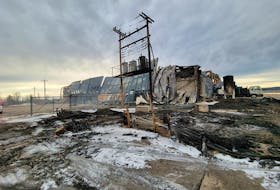ST. JOHN'S, N.L. — With a public court system that is requiring near-daily evaluations when it comes to finding ways to safely operate during the COVID-19 pandemic, some sheriff’s officers in St. John’s say they are being left exposed and at risk.
“McDonald’s restaurants are taking more precautions. Even supermarkets have done more,” one deputy sheriff told The Telegram late last week.
There are close to 100 deputy sheriffs in the province and within the court system their job description includes the security of staff and members of the public, security and transport of offenders and those accused, guarding juries in deliberations and enforcing arrest warrants.
According to their job profile on the provincial government’s website, they also face significant health risks, even at the best of times.\
Related
- Three new presumptive positive cases in Eastern Health region announced Sunday
- Husky Energy suspends West White Rose Project in Newfoundland
“Constant exposure to distracting noise, dirt/dust/filth, hazardous chemicals, body fluids and waste, infectious disease, odours” as well as physical dangers and threats are among the things listed in the document that the officers sign up for when they take the position.
“While performing searches, the deputy sheriffs come in close physical contact with prisoners who may be bleeding or have dried blood or excrement on their persons, have contagious diseases, and who are violent,” the description reads.
It’s the infectious disease aspect, a lack of timely information, and not enough leadership from their management that’s the most concerning in light of the COVID-19 pandemic, some sheriff’s officers in St. John’s say.
The courts have implemented a number of changes in protocol over the past two weeks, drastically limiting the number of people passing through. The province’s superior courts have banned members of the public, postponed jury trials, and are dealing only with urgent cases and matters of people in custody. Provincial Court, which sees hundreds of people come and go every day in St. John’s alone, is currently restricted to hearing matters of people in custody as well as new arrests and bail hearings. All other cases have been postponed for a minimum of 10 weeks.
"...how can I be expected to do my job and comply with the rules to stop the spread of coronavirus at the same time? I can’t."
“As of this past weekend, no newly-arrested person in custody is being transported to court, appearing instead via video from the lockup. It’s a welcome measure for many deputy sheriffs, who say they are nervous about the close contact of transporting people in a van that is never sanitized, scanning members of the public and their belongings at points of entry to courtrooms, finding themselves short on Lysol wipes and gloves, and working on a schedule that sees some officers having more human contact than others.
“My fear is that someone will bring (the virus) into the courthouse and one or many of us will be infected and bring it home to our children, elderly family members and any immunocompromised individual who is too weak to cope with this,” one sheriff’s officer said. “It’s impossible for us to be socially distant while working.”
“We have to work. I get that and I’m glad to be able to do it. I appreciate that the court system is an essential thing and can’t just shut down,” said another. “But how can I be expected to do my job and comply with the rules to stop the spread of coronavirus at the same time? I can’t.

“I understand that it’s an unusual situation. I understand that there are lots of things to consider besides us and court. But on the one hand government is saying for everyone to put all these things into practice to flatten the curve of the virus spread, and on the other hand we aren’t being given what we need to do that, for us or for the public.”
Justice and public safety minister Andrew Parsons said he has received one e-mail from a deputy sheriff relaying the concerns and wants them — and all others working in the justice department — to know they are valued.
“I get where they’re coming from, because these are frontline staff. All these people, sheriffs, police officers, correctional guards, lawyers in the department, they don’t get to stay home, the same as those in our healthcare system,” he said. “But I think everybody realizes this is a situation that no one has ever seen and I think we’re doing a pretty good job of triaging the issues that come in, getting responses and trying to get them out."
Decisions regarding the courts are made by court officials in consultation with the justice and health departments, Parsons said, and with the quickly-evolving COVID-19 pandemic, it’s a high-stress situation. By the time an announcement goes out, the decision has to be revisited because things have progressed, he explained.
Hospitals, care homes and prisons are also experiencing a shortage of personal protective equipment, Parsons said, and the province is working on the large-scale procurement of more. Court protocols and restrictions will continue to tighten and be fined tuned. He quoted the province’s health minister, John Haggie, likening the situation to “fine-tuning and fixing your engine while the car is driving.”
Parsons acknowledged he was concerned by some deputy sheriffs’ claims that they have not been getting timely information regarding changes to court protocol, and in many cases, have learned of them through the media or by checking the justice department’s Twitter account.
“I’m not aware of that and I will be looking into it,” Parsons told The Telegram. “I agree that the free and quick flow of information is important and I take these concerns seriously."
Union listening, communicating

Jerry Earle is president of the Newfoundland and Labrador Association of Public and Private Employess (NAPE), which represents the deputy sheriffs as well as hundreds of others working in vulnerable positions during the current public health emergency. He’s impressed with what he says is an unprecedented level of communication between the union and high-up government officials, which happens on daily basis with the view of mitigating risk and getting information out. He’s heard of a shortage of protective gear from members in many sectors, and the union is among those working to obtain more. Unique times call for unique measures, he said.
“Some things are not happening, unfortunately, as quickly as the front lines would like to see them, but these things are being communicated. All I can assure our members is that every day, somebody in NAPE, including myself, is talking to some high-level officials in government.
“I know sheriff’s officers sometimes feel they’ve been forgotten, but they are on the front lines, like others of our members in so many different areas. I’m just as concerned about the sheriffs and the correctional officers as I am about the LPN and the person who’s working in environmental services. We’ve been working 16-hour days dealing with these issues and we’re going to continue this as long as our members need support.”
Twitter: @Tara_bradbury. Facebook: @telegramtara









